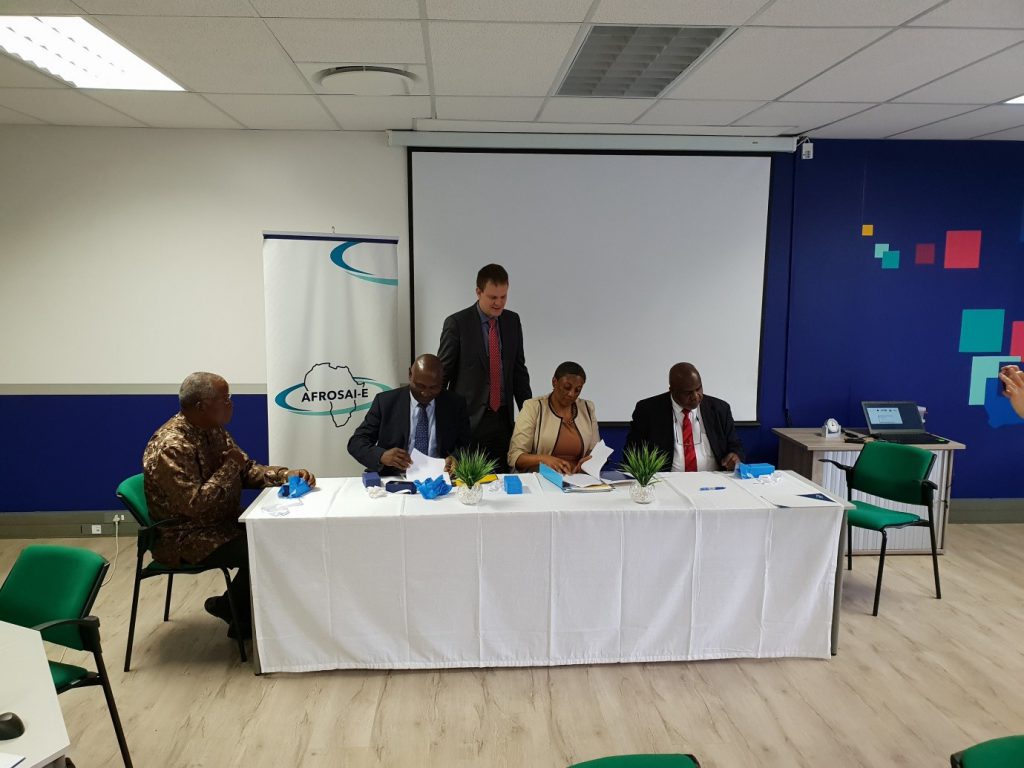The regional project “Performance auditing in the oil and gas industry” is funded by the Netherlands Ministry of Foreign Affairs and led by the Netherlands Court of Audit (NCA) in partnership with AFROSAI-E. Partners in the program are SAI Tanzania, SAI Mozambique and SAI Kenya. The purpose of this regional project is to further improve the quality of performance auditing activities in the oil and gas industry and to stimulate capacity building and knowledge distribution in the region. The kick-off of the project (including SAI leadership and audit teams) took place on 4th and 5th February 2019 at the premises of AFROSAI-E in Pretoria, followed by a three-day workshop for the audit teams (6th -8th February) to start working on their audit designs.
The objectives of this kick-off meeting were twofold: To discuss recommended areas of focus from the perspective of extractive sector specialists to identify and agree on the audit topics for this regional project
All participants registered for the event (33) attended the kick-off meeting, including the Auditors-General from SAI Tanzania and SAI Kenya. SAI Mozambique was represented by one of their Judge Counsellors. After the welcome remarks by leadership, the Founder and President of Resources for Development (Res4Dev) contextualized and presented the commonalities of the value chain of the oil and gas sector in Tanzania, Mozambique and Kenya. The presentation included an explanation on how audits can contribute to an increase of the return in public value from natural resource wealth. A fair share requires coordinated activity across the value chain. This includes a good deal (original contract, amendments, and infrastructure) and monitoring project costs and project revenues (volume and value). With the oil-projects entering the construction phase in the three countries, it has been recommended to prioritise the audits around monitoring and assess the “whether” and the “how”. The participants were advised to formulate system performance audit topics within the following four focus areas: (i) assess government effectiveness and efficiency (ii) processes, information, capacities and results; (iii) assess cross-government responsibilities for management; and (iv) preparedness / anticipate future risks.
Each country team had formulated “cost monitoring” as an audit topic for one of their studies, allowing for a parallel audit. The preliminary objective of the parallel audit will be “to assess the effectiveness of the systems put in place by government and to monitor costs incurred by International Oil Companies under the Production Sharing Agreements”. In addition to the parallel audit on cost monitoring, an additional three audit topics were identified. SAI Kenya intends to monitor the implementation of the exploration provisions in the Production Sharing Contracts. SAI Mozambique intends to assess whether existing mechanisms in Mozambique are adequate and efficient to ensure environmental protection of natural resources in the production of gas. SAI Tanzania intends to look into the public investment decision around a specific gas pipeline put into place.

The kick-off meeting was followed by a three-day workshop to support the audit teams on their audit designs, which included the formulation of the objective of the studies, audit scope, key questions and sub-questions. The trainers facilitated the harmonization of the questions for the parallel audit, ensuring answers can be compared. To this end, the key question for the parallel audit for all three countries has been formulated in close alignment with the following question: “To what extent has government an effective system in place to monitor the costs incurred by the international oil companies as per the signed / model production sharing agreement”. To facilitate the alignment of the parallel audit and to ensure peer learning, the three audit teams working on the parallel audit (cost monitoring) will get together again in Pretoria (premises AFROSAI-E) mid- May 2019, followed by coaching of the other audit team of SAI Kenya at the same location. The other two teams will be visited in their countries. The objective of this second gathering is to finalize the audit framework, define core questions for the main study and plan the main study.

Partnership with other parties
A representative of the INTOSAI Working Group of Extractive Industries (WGEI) attended both the kick-off meeting and workshop. The representative shared relevant WGEI reports that the SAIs can consider when designing their audit plans including additional external resources.
As a partner in this program, AFROSAI-E has been closely involved in developing the agenda for the kick-off meeting, and has taken care of all logistical arrangements in-country. The kick-off meeting and workshop took place at the premises of AFROSAI-E. The AFROSAI-E Extractive Industry Guidelines were consulted by the participants prior to the event.
Strengthening the knowledge and understanding of undertaking performance audits in the petroleum sector is essential to assist resource-rich countries in securing a fair share of the revenues generated from the sector. To that end, a learning module on Performance Auditing in the Petroleum Sector is being developed as part of this project. The learning module will be made available as a stand-alone module offered through the online learning platform of AFROSAI-E in 2020.
As WGEI the working group will continue supporting this project in its effort to promote the audit of extractive industries within the INTOSAI community in order to promote good governance and furtherance of the UN Sustainable Development Goals.
By Sybrand Struwig (SAI South Africa)





